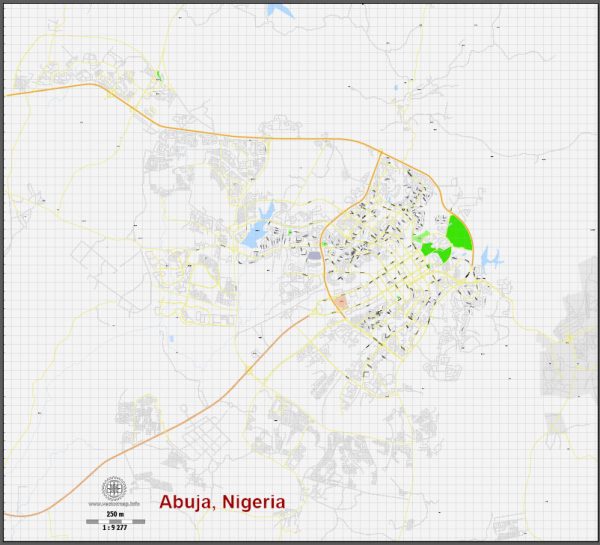Abuja is the capital city of Nigeria, located in the central part of the country. It officially became the capital in 1991, replacing Lagos, which remains the country’s largest city. Abuja was chosen as the capital due to its central location, which is more geographically balanced compared to Lagos and better suited for administrative functions.
Vectormap.Net provide you with the most accurate and up-to-date vector maps in Adobe Illustrator, PDF and other formats, designed for editing and printing. Please read the vector map descriptions carefully.
Here are some key aspects of Abuja:
- Geography: Abuja is situated in the center of Nigeria’s Federal Capital Territory (FCT), within the Savannah region. The city is characterized by undulating terrain, rocky hills, and green landscapes. The Aso Rock, a massive rock formation, is one of the city’s prominent landmarks.
- Planning and Architecture: Abuja is known for its well-planned layout and modern architecture. The city was designed by the Japanese architect Kenzo Tange and developed by various international and Nigerian architects and planners. The central area is divided into phases, each designated for specific purposes such as residential, commercial, and government offices.
- Government Presence: Abuja serves as the political and administrative center of Nigeria. It houses the three branches of the Nigerian government: the Presidential Complex (Aso Villa), the National Assembly Complex, and the Supreme Court. The city is a hub for political activities and hosts various government institutions and foreign embassies.
- Economy: While Abuja is primarily known for its governmental functions, it has a growing economy with a focus on services and commerce. The city is home to various businesses, banks, and international organizations. The construction and real estate sectors have also seen significant growth in response to the city’s expanding population.
- Cultural and Recreational Facilities: Abuja offers a mix of cultural and recreational amenities. The city has museums, art galleries, and cultural centers that showcase Nigeria’s rich history and diverse cultures. Additionally, there are parks, gardens, and recreational spaces where residents and visitors can engage in leisure activities.
- Infrastructure: Abuja has well-developed infrastructure, including a network of roads and bridges. Nnamdi Azikiwe International Airport serves as the main gateway to the city. The transportation system is continually being improved to accommodate the city’s growing population.
- Diversity: Like the rest of Nigeria, Abuja is home to a diverse population representing various ethnic groups, languages, and cultures. People from different parts of the country come to Abuja for work, study, and other opportunities.
- Education: Abuja hosts several educational institutions, including universities, colleges, and research centers. These institutions contribute to the intellectual and academic growth of the city.
In summary, Abuja is a dynamic and rapidly growing city that plays a crucial role in Nigeria’s political, economic, and cultural landscape. Its well-planned infrastructure, governmental institutions, and diverse population make it a significant center for both national and international activities.


 Author: Kirill Shrayber, Ph.D. FRGS
Author: Kirill Shrayber, Ph.D. FRGS